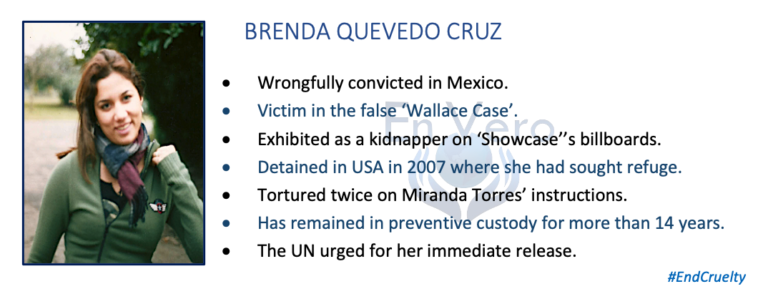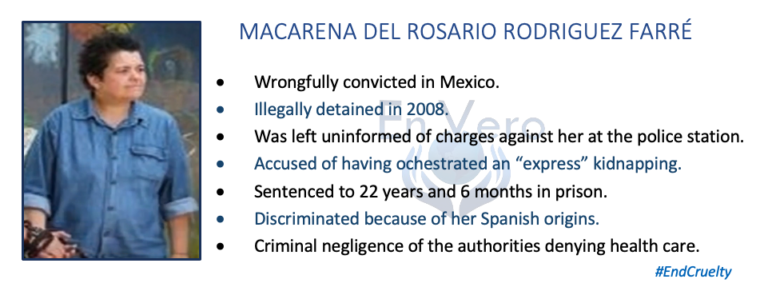Source: Los Ángeles Press
Author: Irene Moreno
Jan. 25, 2019 (Original publication on January 15, 2019)
Translation: Jorge B.
Europeans victims of the manufacturing of culprits in Mexico
Recently, it has been revealed that the manufacture of culprits in Mexico has been a common practice, promoted by the State, and has featured the most emblematic cases of human rights violations in this country. According to a report from Amnesty International (AI), in Mexico arbitrary detentions are a daily occurrence and very often the starting point of serious and persistent human rights violations in the country, such as torture and other ill treatment, enforced disappearances and extrajudicial executions.
The reasons that Amnesty International found out about the daily and arbitrary arrests by the police of different forces are: extortion from those who they arrest, payments by third parties to arrest somebody, politically motivated arrests (participants in social movements or human rights defenders) or planting evidence and thus not having to investigate the crimes that do take place.
Not only Mexicans have been victims of the manufacture of culprits. On November 5 and 6, 2018, a forum was held in the Chamber of Deputies (Spanish) of the LXIV Legislature of the Congress of the Union, organized by the journalist Guadalupe Lizárraga and David Bertet of the Canadian Association for Rights and Truth “En Vero“, in which there was a hearing of more than 150 relatives of victims. Among these, three cases of European citizens stood out, victims of corrupt judicial authorities, as well as of the ex Secretary of Public Security, Genaro GarcíaLuna, during the Felipe Calderón administration, and formerly in government with former president Vicente Fox. These are the cases of Florence Cassez, the French citizen who was illegally arrested in 2005 and was in prison for seven years falsely accused of the crime of kidnapping; the Basque Luis Miguel Ipiña, who was also arbitrarily and illegally detained in 2011 and spent almost two years in prison falsely accused of possession of arms exclusive to the army; and the Spanish citizen Arturo Bargueño Pietro, who was arrested under the same conditions in 2006 and spent six years in prison falsely accused of drug trafficking.
The case of Arturo Bargueño
Arturo Bargueño Prieto had practically spent his entire life in Madrid, but his desire to travel and the fact he had family in Mexico led him to visit Mexico. After spending several days there, he was fascinated by the culture, the cuisine and its beautiful places so he decided to stay in Querétaro to set up a computer business.
His passion for electronic music led him to visit frequently El After that was in front of his local-house. On the night of April 9, 2006, after spending several hours listening to music in the club, he took a taxi at 4:50 a.m. to take his girlfriend home. Suddenly, a black Jetta car lunged against the taxi driver. From the black vehicle, three hooded men came out and pointed their arms at Arturo and his companion, and forced them out of the car. The attackers took off their balaclavas and made themselves known as federal agents.
At that time, Arturo Bargueño was kidnapped by police of the Federal Investigation Agency, created by Genaro García Luna, and part of the Attorney General’s Office (PGR). At 5:00 a.m. they took him back to El After, where an illegal operation was taking place in which more than 20 federal agents participated without the PGR, based in Querétaro, being made aware of it.
Arturo was brutally beaten by eight policemen in order to take from him the keys to his computer business. After getting what they wanted, they forced him into a car and took him away. It was 6 a.m. when the police decided to take him to the emergency services of the Red Cross due to the serious health condition he already was in because of the beating they had given him.
After doing several tests, the doctors ordered his immediate admission to the General Hospital. At 6:50 a.m., during Arturo’s transfer by ambulance, federal agents intercepted the vehicle and forced it to change its route to the PGR government facilities, putting Arturo’s life in danger.
His serious state of health was getting worse, for that reason, the public prosecutor’s office itself ordered the emergency transfer to the General Hospital of Querétaro. The hospital’s official document indicates the time of arrival at 9:25 a.m. on April 9, 2006.
Meanwhile, in one procedure at 9:30 a.m. of the same day, a man by the name of Iván López Sánchez testified at the PGR accusing Arturo of selling drugs and stating that he recognized him as the culprit because he had seen him, something impossible since at that time he was being taken care of at the hospital. This shows that Iván was a false witness.
After receiving emergency medical attention, Arturo was taken to jail where he was brought to justice. There he saw a poster that read: “You are in this area as a detainee, therefore, you have the right to call human rights.” Desperate, Arturo began shouting that he wanted to make a call. The first call he made was to human rights, but at that time there was only the guard and he was not helpful.
Arturo suffered a series of human rights violations. He was deprived of his freedom, arbitrarily and illegally detained, his rights were not read to him and he did not know what he was accused of until he arrived at the courthouse. The federal officers had the obligation to notify the embassy of the situation, but the notification never reached the Spanish authorities. In addition, the alleged culprit had to testify before a judge without the advice of a lawyer.
According to Amnesty International, any detainee has a series of rights to protect him from abuse. Among them, to be informed immediately and in detail of the reason for the arrest and the rights that can assist him, to be able to count on legal advice and representation from the moment the arrest takes place, and to be able to inform his family or those closest to him of his situation.
Also, under national and international law, you must know what authority is depriving you of your freedom, and your arrest must be immediately registered . These rights are not always respected by police officers in Mexico.
Consequences of the manufacture of guilt
While he was testifying, Arturo lost consciousness due to his serious state of health and was admitted to the hospital. At that time he already knew what he was accused of, but he had no knowledge of his sentence. One of the times when an official went to take a document for him to sign, Bargueño took the opportunity to ask him how many years he could be sentenced to. Then, he was informed that the sentence could be to over 50 years.
“I wanted to hang myself, but when I was going to do it, I thought that if it did not work out I could be disabled and that would be worse”: Arturo Bargueño
The first thing he did was to look at the sheet he had in the clinic and to wish to die, but he realized that that was not the solution. So, he decided to focus all his efforts on demonstrating his innocence. He spoke with the deputy director of the prison and asked him to give him a Constitution of the United Mexican States, and he began to study the laws of the country.
In Mexico, a defendant has the option of directing his own defense, even if he does not have any legal knowledge. Arturo decided to take charge of his legal defense, after years of having his lawyers show an overwhelming negligence and collect important amounts for their fees from the Bargueño family. Thus, Arturo began to request evidence, present appeals and rights of amparo. Not only did he take care of his argument, but he also helped prepare legal documents for other inmates who were going through a fabrication of guilt situation.
In prison, he became friends with some prisoners and policemen. Many asked him why he studied the laws of the country since he was going to leave in a wooden box. Arturo would answer: “Well, I will leave in a wooden box but with a smile from ear to ear because I will die fighting against you. I have two options: surrender or move ahead and I prefer to move ahead.”
He was in preventive detention for 5 years, 11 months and 13 days, during which he was subjected to all types of torture, both physical and psychological. The jail conditions were very detrimental, he points out. It was a prison with capacity for 900 people, but there were more than 2,000 prisoners.
Arturo explains that the cells were designed for four inmates, but there used to be more. They did not have beds. In their place, there were rectangular stones and they would give them a foam full of bugs to put on top, but every time they would buy their stone, they would change their cell. And food always was scarce.
“I have seen many people die in front of my cell, some because they did not receive the medical care they needed and others because they would commit suicide”
During his stay in prison, he was treated by psychologists and psychiatrists, who wanted him to think that his testimony was false and insisted that he had not been kidnapped in the ambulance and assured him that it had all been a hallucination of his. So much was the manipulation by the public servants that Arturo came to doubt his own version, but he continued investigating on his own. He asked the judge to request the official documents proving his medical care at the Red Cross and his transfer by ambulance, and he got the documents verifying his argument.
The problem of impunity
The victim details that there were more than 30 authorities involved in this police machination. And he assures that most of the people in charge that signed the documents for his arrest and falsification of evidence were not aware of what they were approving. “They signed to do favours. They signed because they never thought that a person would start to investigate from inside the prison and that he alone would look for evidence because they are used to nothing ever happening,” says Bargueño.
Amnesty International explains that when the police leave the detainee in the custody of another authority, such as the Public Prosecutor’s Office, they are legally required to provide a report with sufficient information to determine the reasons and circumstances of the arrest.
However, these documents tend to have substantial errors, false facts and other serious problems, such as those not always being prepared and signed by those who actually participated in the arrest, as required by Mexican law but by other persons who did not participate in the arrest.
Ninety-nine per cent of crimes in Mexico go unpunished. This high index of impunity in Mexico promotes, more and more frequently, the participation of federal agents in illegal arrests, the creation of false evidence with phantom or coerced witnesses, the kidnappings, the torture and the unjust imprisonment.
Despite his willingness to find evidence proving his innocence, Arturo Bargueño spent six years in jail. He made an appeal providing all the evidence that declared him innocent, but they refused to verify the documents. After serving the sentence for his alleged crimes, he was released. To date, the documents he presented have not been reviewed. For that reason, his case has been brought up to the attention of the Inter-American Commission of Human rights (IACHR).
New aggressions by the authorities
Once released, Arturo wanted to prove his innocence and stayed a couple of years to investigate his case promptly. However, when he was collecting more evidence, he was a victim of attempted kidnapping by authorities. For that reason, he decided to return to Spain. He arrived psychologically very affected and was diagnosed with post-traumatic stress. After the experience, Arturo has had a hard time trusting people. He can not sleep because all those memories come to mind and he has a constant need to learn more laws. His body suffers from intense pain as a result of torture and the long time he spent handcuffed with his arms behind his back.
“However much justice is done the psychological damage I have and the six years I spent in prison are irreparable”
After many years of suffering, Arturo tried to start a new life in his home country as a freelancer doing computer repairs. There was a lot of competition in that field and the business did not give him sufficient benefits so he changed his line of work. First he was a telephone operator and later a commercial operator for Prosegur. From this company he was fired for having his Web page (Spanish), in which he explains in detail his judicial case in Mexico and demonstrates his innocence in this event. Now he is waiting for a decision after requesting his disability.
Arturo has learned that at the end of the cliff one always finds a path, which can always be changed. This terrible situation of human rights violation has helped him to see life in another way, he says. “In spite of everything, something good has come out of it: the person I have become through the struggle for my freedom”.




